Movies - The Little Mermaid : Our filmmaker global press conference transcription
By Mulder, Los Angeles, 09 may 2023
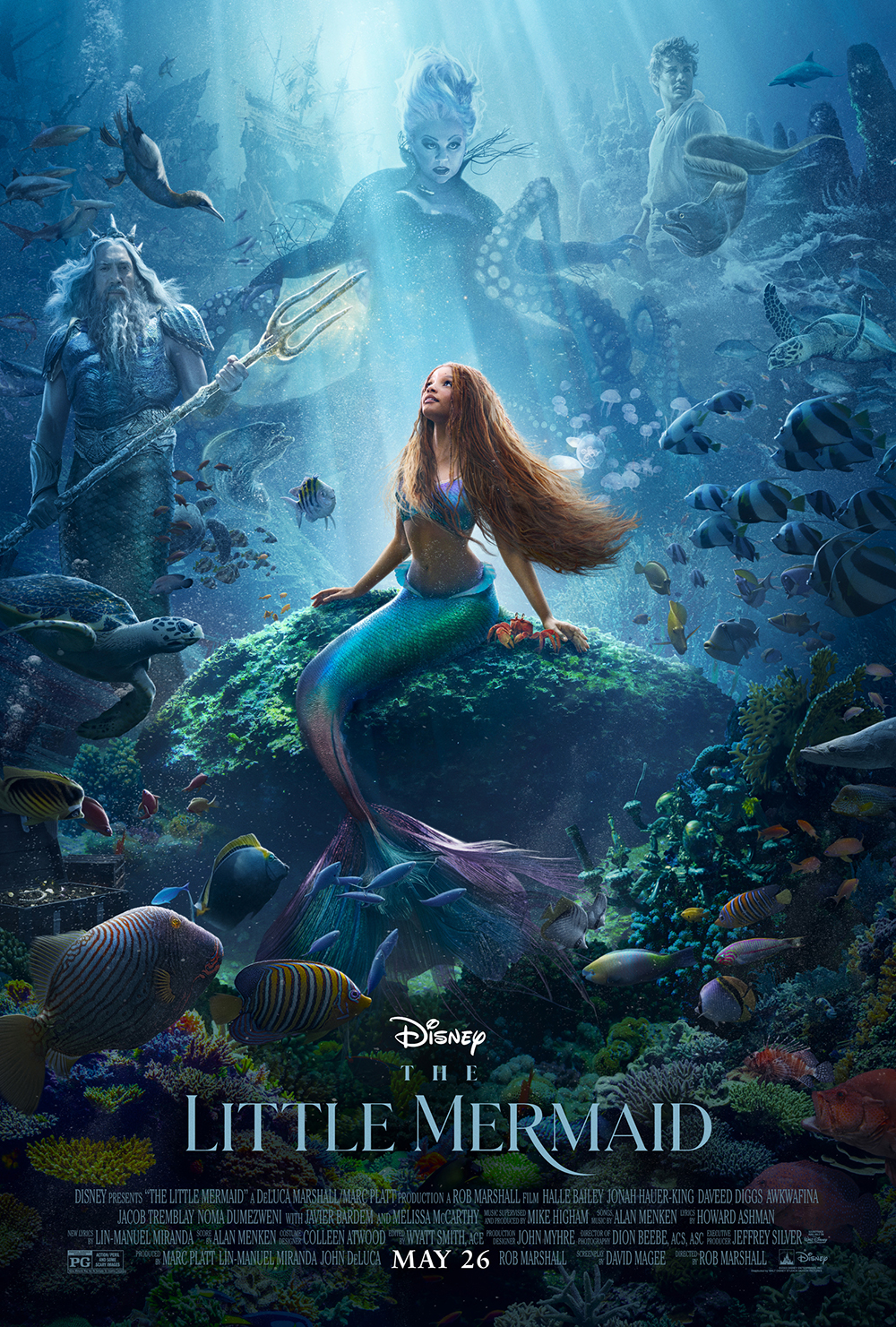
The Little Mermaid is a 2023 American musical fantasy film directed by Rob Marshall from a screenplay written by David Magee. Co-produced by Walt Disney Pictures, DeLuca Marshall, and Marc Platt Productions, it is a live-action adaptation of Disney's 1989 animated film of the same name, which itself is loosely based on the 1837 fairy tale of the same title by Hans Christian Andersen. The film stars Halle Bailey in the titular role, alongside Jonah Hauer-King, Daveed Diggs, Awkwafina, Jacob Tremblay, Noma Dumezweni, Javier Bardem, and Melissa McCarthy. The Little Mermaid follows a mermaid princess Ariel who makes a deal with a treacherous sea witch Ursula to trade her voice to human legs in order to impress Prince Eric, who is saved from a shipwreck, before the time runs out. Plans for a remake of 1989's The Little Mermaid were confirmed in May 2016. Marshall joined the film as director in December 2017, and much of the main cast signed on from June to November 2019. Production was expected to begin in London between late March and early April 2020 but was delayed by the COVID-19 pandemic.
Nischelle : Hello there, everyone. I'm Nischelle Turner. Welcome to this very special Little Mermaid Press Conferences [with the masterminds behind this film, the creative masterminds, by the way. Before we get started, I do want to remind everyone to get your questions in. Use that Q and A function that you have there, get your questions in, because I am going to take audience questions in just a little bit. But right now, I am joined by these three gentlemen, and I appreciate you. First of all, Alan Menken. How are you? Thank you for joining me
today.
Alan Menken : I'm great. Thank you. Great to be here.
Nischelle : Yes, absolutely. And then Jon DeLuca. How are you today?
John DeLuca : I am great. I am great.
Nischelle : I mean, you look, like, fresh. You look very European today, John.
John DeLuca : I look fresh, but to be honest, we had an opening last night. So I'm fresh off that.
Nischelle : There we go.
John DeLuca : I didn't see the bed. [It's far?] from here.
Nischelle : We're gonna talk about that. Rob Marshall, thank you for being here.
Rob Marshall : Oh, thank you, Nischelle. Lovely to see you always.
Nischelle : So I saw you guys last night, as it was before the movie started. So there was still that anticipation of, all right, here we go. And now that you've seen it, the audience was losing their minds throughout this film. Like, cheering after every musical number. So excited. How are you feeling this morning?
Rob Marshall : Well, it was a dream premiere. I mean, there's nothing like that. I mean, when you imagine what it will be on a massive screen like that in the Dolby Theater with this gorgeous audience that was just there to actually enjoy every moment of it, and it was a dream come true for all of us. I mean, it was very emotional. It's taken us four and a half years to create this film. So to have it play like that with, you know, our entire cast was there, which we brought up on stage, which was incredible. They were on stage as well. It was just, I don't know, it was one of the great moments in our lives.
John DeLuca : And I was amazed at how much they listened. 'Cause, you know, sometimes it premieres, they just go wild and it's just like, whooping, you know, excited. But I heard it differently last night. And I've seen it quite a number of times. [laugh] I heard every line and every breath. They were really with it. They were really wanting to go on the journey.
Alan Menken : You know what I particularly liked also, I was sitting right behind Daveed Diggs who had not seen the movie before.
Nischelle : No, yes.
Alan Menken : There he is, Sebastian, watching for the first time. And you see him -- [laugh]

Nischelle : Wide-eyed.
Alan Menken : I kept peeking around him.
Rob Marshall : And Awkwafina made us laugh so hard because she said, "I'm so embarrassed. I was laughing at myself." [laugh]
John DeLuca : I loved it so much I laughed at myself.
Nischelle : Well, I did hear that the audience got a huge kick out of the rap. Out of Scuttle. Yeah, I mean, just
the biggest kick out of, which I loved that part in the movie myself.
John DeLuca : Two of my favorite.
Rob Marshall : They're just gold, you know, them. All three amigos.
Alan Menken : Oh my god.
Rob Marshall : They're just so adorable together.
Nischelle : John, didn't you say that Under the Sea was themost complex thing to shoot in the film?
Nischelle : And why was that?
John DeLuca : And to conceive and shoot. And just, to have an idea of what we're gonna do, and then how we were gonna do it. The logistics of that. I remember Rob and I kind of put it aside for a long time.
Nischelle : [laugh] We'll get to that.
John DeLuca : You know, it was kind of, "We'll get to that." And it kind of was the last one.
Rob Marshall : I know, it was so daunting. Because there's one live actor. One live actor in this massive production number.
Alan Menken : And the expectations are probably crazy about, yeah.
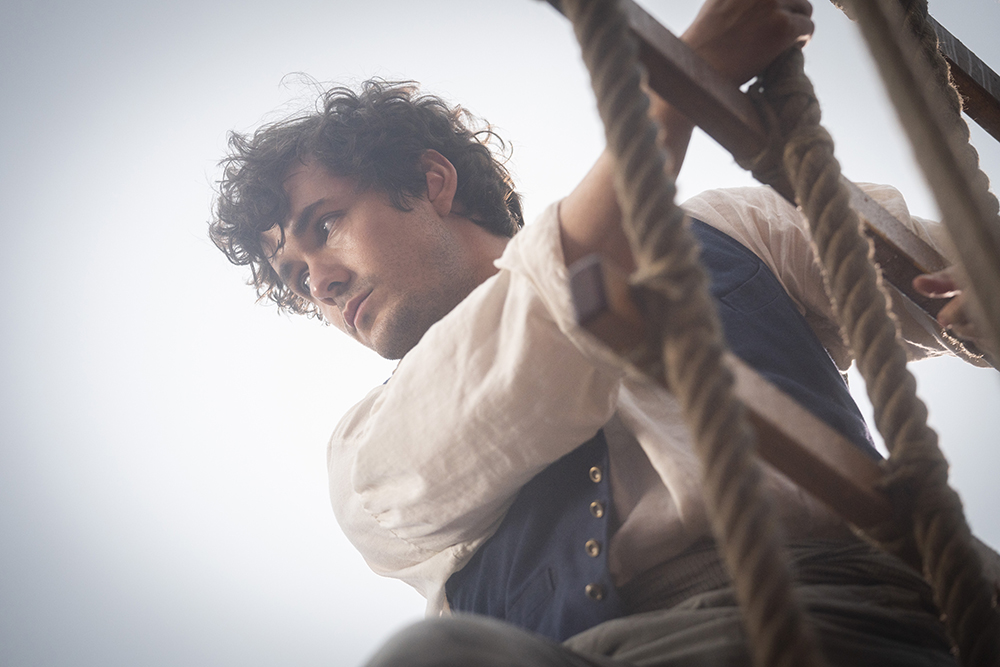
Nischelle : Well, it's Under the Sea.
Alan Menken : I know.
John DeLuca : Academy Award-winning song.
Nischelle : Absolutely. It's the song. And on this one, I loved it, 'cause Ariel got to sing in this one, and in --
Rob Marshall : Well, Alan wrote that for us, which was so beautiful.
Alan Menken : Always at the spur of the moment.
John DeLuca : On the spot. That's what happened.
Rob Marshall : Yes, that was the best. I mean, you know, we said, "Alan, we really need her to sing," and he went into the piano and said, "How about this," and, "How about this," and --
Nischelle : Come on.
Rob Marshall : -- we tried it on Halle --
John DeLuca : "It's what I do. It's what I live for."
Nischelle : Listen at you -- [laugh]
John DeLuca : But I find --
Alan Menken : [singing]poor unfortunate [soul]… [laugh]
John DeLuca : And I find that a lot of the best things happen like that. So Halle's rendition of Part of My World -- Part of Your World.
Rob Marshall : Sorry.
Alan Menken : That's okay. [laugh]
John DeLuca : Part of That World? Sorry.
Alan Menken : Whenever World.
Rob Marshall : Your World.
John DeLuca : Part of Your World happened in the audition. In her audition, we were like, Rob and I were like, we want to know whether she can belt. Can she go, "Da-ah-ah." You know, so we tried all these things, and then we said, "Can you riff?" And it happened, like, Under the Sea. In the moment.
Nischelle : Can we talk about that? Because, Alan, she did say to me, she said, "He gave me a little creative
license." And she was nervous, because Part of Your World is signature for her. So did you have any nervousness just saying, "Do your thing?"
Alan Menken : No, not at all. No. I'm not really an intimidating person, but [laugh] I think the composer role can be intimidating to actors.
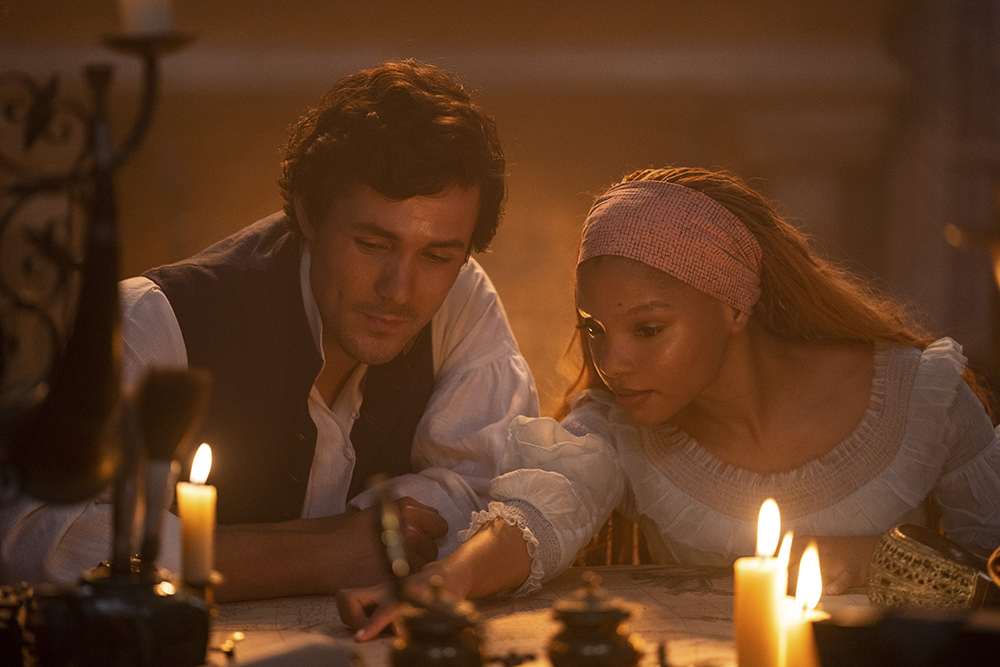
Nischelle : Well, your music in this is iconic and legendary, so maybe that's the intimidating part.
Alan Menken : Yes, I guess. But I really, I try to filter everything through the music scene as much as possible because they should have somebody they're really comfortable within the room who's plunked out the notes for them, and giving them phrasing notes. And then when I give notes, I want to go through them also. I don't want them to be assaulted with "Alan thinks this and this person thinks that." Just make it your own, and after you make it your own, and if I have anything to say, I'll say it. But oh my god, she is --
Nischelle : When you heard her do that for the first time, take me back to that moment.
Alan Menken : Well, she's adorable. She's completely adorable. She's so talented. You can't take your eyes off her.
Nischelle : True.
Alan Menken : The emotion is just right there on her face and in her voice. She's just, she's Halle Bailey. She's a delicious person. And she's amazing, Ariel. And you see it in levels, right? I mean, we had our recording sessions, then you allowed me to see the movie when it was just first put together very roughly. And Wyatt, the editor, kept tapping to bring over boxes of tissues for me. Because when we got to Part of Your World, I was just weeping. Part of it is the, you know, missing Howard kinda reaction, and also just remembering the innocence of what we put in there originally, and now look at it. then last night, and last night seeing it on that huge screen at the Dolby was just --
Nischelle : The shot of just her face when she's holding that note is, I mean, goosebumps. I was like, "What is it? What's happening to me?"
John DeLuca : Well, Rob, when she first auditioned and sang the song for us, I turned to Rob and there were tears streaming down his face.
Rob Marshall : I mean, here's the thing. The first actor we saw for this role was Halle. The first thing she did is she came in and sang for us. And she sang that song. She shut her eyes and started to sing the song. And I thought, I couldn't believe what I was hearing. I just thought she's so deeply connected to what she's singing about. It's so emotional. It's so beautiful. And I thought, [laugh] oh my gosh, we've been doing this for five minutes. Have we found Ariel? And we had.
John DeLuca : Little did we know.
Rob Marshall : But we didn't know that. But then we saw hundreds of other actors after that, and Halle kept coming back in. And we saw every ethnicity. We saw everybody. And she claimed the role for hers. That's what happened.
Nischelle : Mm. That give me chills right there, it did.
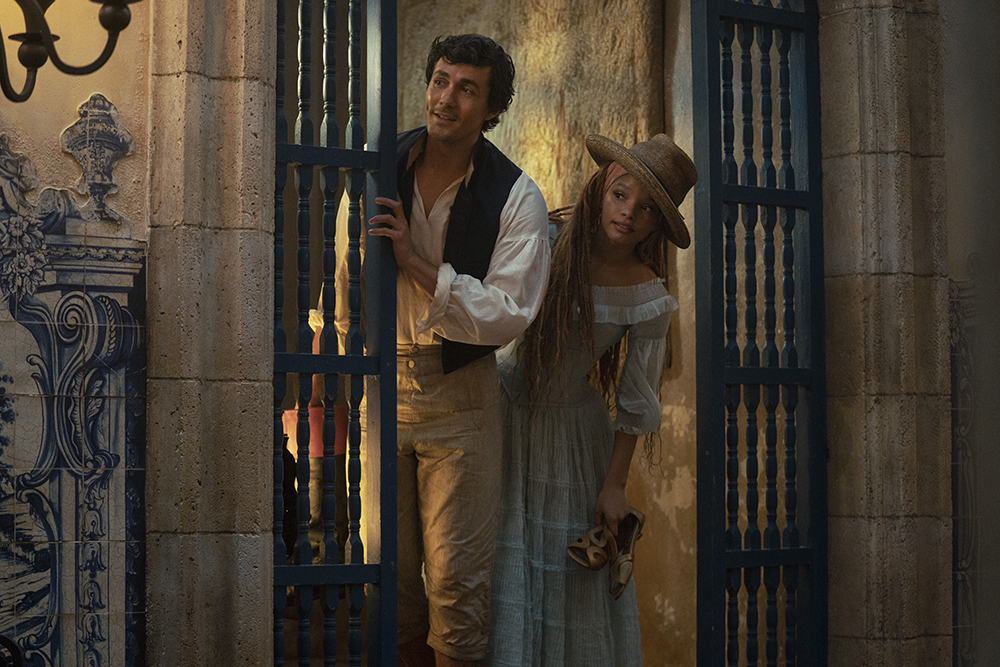
Nischelle : Alan, so we got new music for this, which I think is fantastic. Where do you decide, like, where do these come about? How do they land in the film? How do those conversations --
Alan Menken : It's a group process. Rob and John, David Magee, Lin-Manuel Miranda and me got together. Like first at your apartment, then at my studio. And we went through how the story's being adapted by David, and how the structure is. And then where are the potential spots? So it's simply as simple as that. And those decisions are made, first of all, by character, by moment, but also by sequence of a score, and what's needed at a certain moment. So we chose the moment when Prince Eric, he's been told, "Don't go back out there, you can't," and he just thinks about this girl. And it's a love song to her, and it's a love song to the sea. And to his uncharted waters. So his life ahead of him. So it ends up being a real important theme throughout the movie. Then we had the first time she's on land. And was so much fun, because I gave Lin a very sort of lilting tune and he said, "Can we give a kind of a bap-a-bap, mm-bopbop." So it's a three-against-two kind of feel. Said, "Okay, let's do that," and then boom, the song where she's so excited, everything is so new and so wonderful. And then he doesn't think it's a girl and realizes she can't speak. And then she's so, for the first time, heartbroken. And then the scuttlebutt, which is just, that's a surprise gift of him, 'cause I gave him this Caribbean tune. And Lin sort of did a rap over it that was so perfect. Used the music, but it had this rhythmic pulse to it. It was just pure Lin-Manuel Miranda.
Nischelle : The audience flipped.
Alan Menken : I know.
Rob Marshall : They missed the end line, the final line, because they're applauding.
Alan Menken : "Oh, Scuttle, you're too close." I know, I thought about that last night.
Rob Marshall : I was like, well, we didn't build it an applause. Now if I was going back, we were [overlap] and I knew it was gonna get that, we'd definitely delay that.
Alan Menken : Or just put it in sooner.
Rob Marshall : Yeah, exactly. Exactly.
John DeLuca : And just, to further that, when we were writing it, we knew that Eric had no song. So we had to have a song for Eric. You know, he needed his voice.
Rob Marshall : And it's surprising when you think about it. In the animated film, Ariel had one song. A series of reprises, but one song. And so, you know, the fact, I mean, the great thing about working with Alan is that, you know, he's so open to looking at this. And he knew this was a different genre. We're doing a live-action film. And how are we gonna approach this? And we said, "Can we find another place for Ariel?" Well, the challenging thing was that of course she had lost her voice. But we realize, obviously, in film, you can create something where you're hearing the internal thoughts through music, through song. And that was sort of the key for us to find this piece forher. And also accomplished a lot for us too, because it's a montage of all her time on land, until she meets the prince for the first time. So it helped us in so many ways. It was wonderful to have that collaboration. Nischelle : And you had so many actors who we don't think of traditionally when we think of singers. I mean, you had Halle, which of course. But then Jacob who said he had never sang anywhere but in the shower, who has an amazing voice, by the way. Amazing. Amazing.
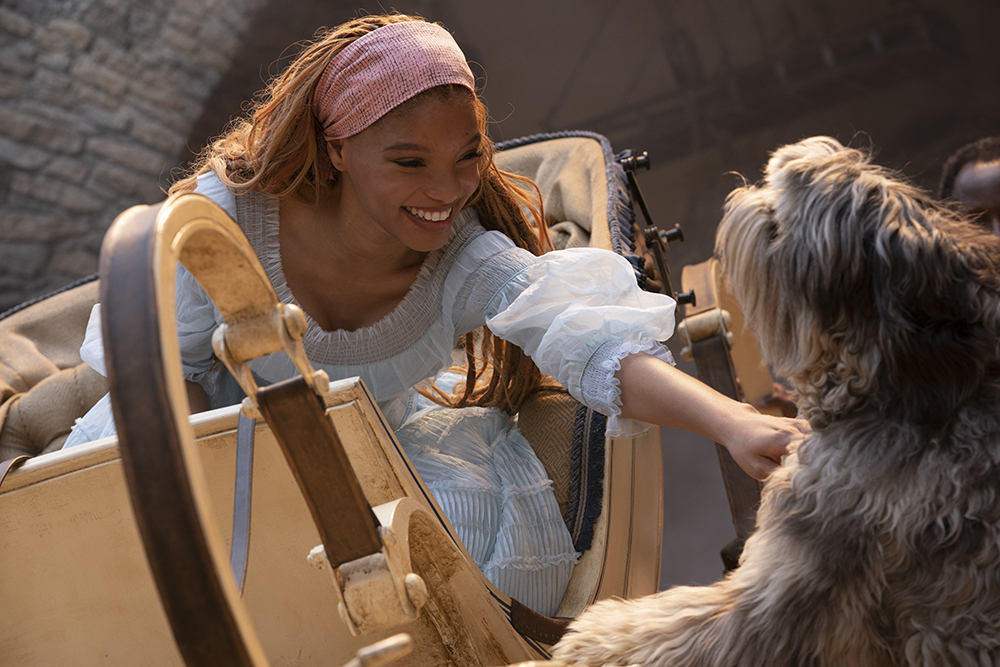
Nischelle : And Jonah and Melissa. And, I mean, we know Daveed can sing. But, I mean, what you guys did with them, for us not to know them as singers, is bananas.
Alan Menken : And, like we say, because we had, also, Javier sang a song that, it happens all the time in musicals, we didn't need that particular spot for the film.
Nischelle : Can we get it in the director's cut?
Rob Marshall : Yeah. Or re-issue like in a few months, right? The whole --
Alan Menken : And he's a wonderful singer.
Nischelle : Yeah. I love --
Rob Marshall : And we love working with actors, don't we John? We love working with actors who are new to musicals. Because they approach it from the right place. You know, they're singing as the character, and they're bringing that sort of scene to life through song. And they don't even realize. I mean, I remember when you're working with Melissa, John, you know, explain that. She was so, sort of --
John DeLuca : [overlap] all of them, it's such new territory, and they all wanted to sing. Even Awkwafina to sing. She raps. To sing. She had this kind of scared, excited feeling about singing. And Jacob. And Melissa was just, when I would ask her to do things, we're just playing in the studio, and then I'd say, "Oh, try this," and she'd try, and she, it's like, "That came out of me?" That's because it's new?.
Rob Marshall : And she's fearless, and so it comes out of the character. You know, and then all of a sudden, she's like, wow. 'Cause a lot of actors are afraid to sing 'cause they think it's this thing they have to, like, fit into. But it's actually extension of their acting work. That's all it is, you know? And that's the kind of singing we love. You know, we grew up on Carol Channing and Rex Harrison and Zero Mostel and these wonderful actors who sing, and that's what brings the song this life.

Nischelle : We talked about this a little bit last night, but I also talked about it with the actors. First of all, they call you the Cheerleader Cloaked in Cashmere. [laugh] That's who you are. That's who you are.
Rob Marshall : I'll take that.
Nischelle : That's who you are. I don't know if I'd call it unconventional, but they were saying the rehearsal process was so different from what they usually know in films. And I think they were saying it felt like they were making something so small, but it was so big. Like, they were doing theater work, like, stage work, it almost felt like, during the rehearsal process. Is that a signature Rob Marshall move, or is that what you knew you had to do for this film?
Rob Marshall : I think it's something I always do. I mean, you know, obviously I come from the theater. We all come from the theater. So there's a process that I think you have to do. Musicals are kind of a hybrid in a funny way. Movie musicals are a hybrid of theater and film. Because you have to, you know, you can't just walk in and start singing. You have to learn. Or the choreography. It's like all part of it. I mean, I always feel that my job as a director is to protect the actors. Make them feel safe in a space where they can screw up and be terrible, and then get better. And not feel judged. I mean, that to me is the most important part of it. And so, it does feel small. It feels intimate. Because you're creating. And you know what, film is very intimate. I mean, of course it's massive in some ways, but the scenes are, you know, in a way, it's a small story. You know, it's about a father and a daughter. You know, a father learning to let go, and these two kindred spirits learning to change the world and not be afraid of someone that's different than them. And so it's this beautiful story. And, you know, I mean, what I never want any actor to feel is sort of the pressure of the film, and pressure of the filmmaking, and the technical portions of it. Because, especially with this movie, we always talk about it, we didn't want the technical aspects of the film to lead it.
Nischelle : Yeah. And it could've easily.
Rob Marshall : Easily.
John DeLuca : Oh, my god. We always rehearse, but in this film, it was crucial to know exactly what everyone was doing.
Rob Marshall : We started on our feet, on the floor, but then we put them up in the air. You know?
Nischelle : Melissa says she never touched the ground.
Rob Marshall : [laugh]
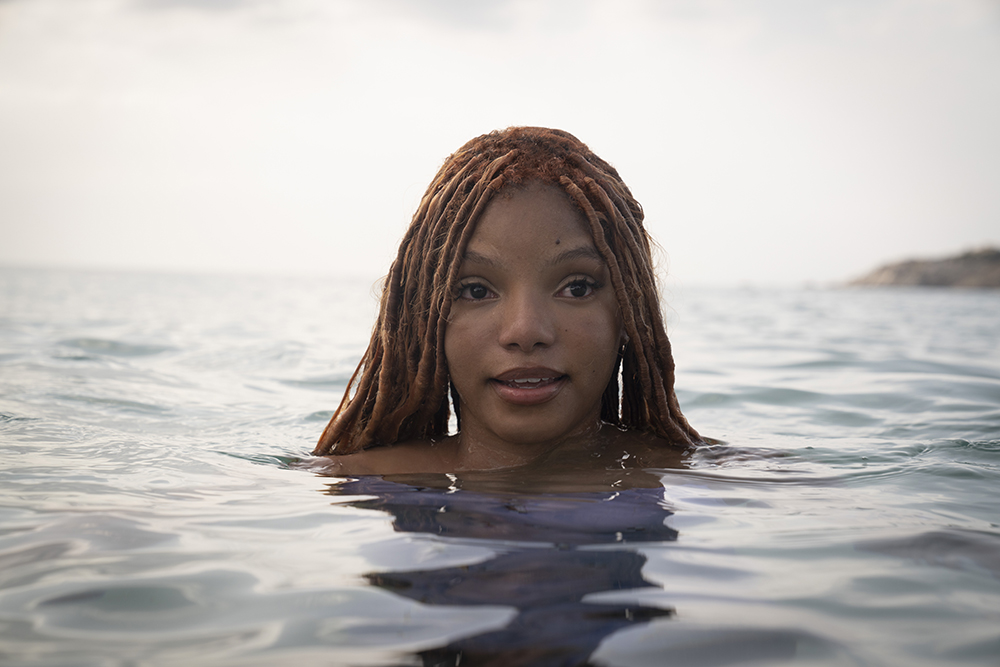
Nischelle : Like, "I sat on that clamshell, but I never touched the ground." [laugh]
John DeLuca : Because then we would have to teach all the stunt people, the 10 to 20 stunt people that would take them through on these apparatus, and they had to know every line, every breath.
Rob Marshall : I mean, sometimes I would say, "action," they would say two lines. And I'd say, "cut," and then we'd put them on another apparatus, put them on wires or something and then go, "Action." And then, one line, cut. Like, literally, it was like a mosaic.
John DeLuca : That's why you have to know what you're playing sodeeply.
Rob Marshall : Yeah. Yeah.
John DeLuca : And then, as Rob always does, it's not frozen. It's never in stone. We're still experimenting and exploring on the day. We're waiting for those magical mistakes.
Rob Marshall : And it's all out of fear. You see what I'm sayin'? There's where it comes from. It's, like, what are we gonna do?
John DeLuca : A healthy fear.
Nischelle : Well, it had to have been, too, because you gave, like, Awkwafina especially, like, creative license to kind of improv and improvise, so sometimes, you might not have known where you were actually.
Rob Marshall : Which is our favorite thing. I mean, she's so in the moment. She's so funny. She said to us last night, did you hear her say this, John? She has this one moment where Sebastian says, "Are you listening to me?"
Rob Marshall : And she says, "Yes, sir."
Nischelle : Yeah. [laugh]
Rob Marshall : All right? So and she said, "I can't believe you used that because I only did that for you, like, as a funny thing in the space." Yeah.
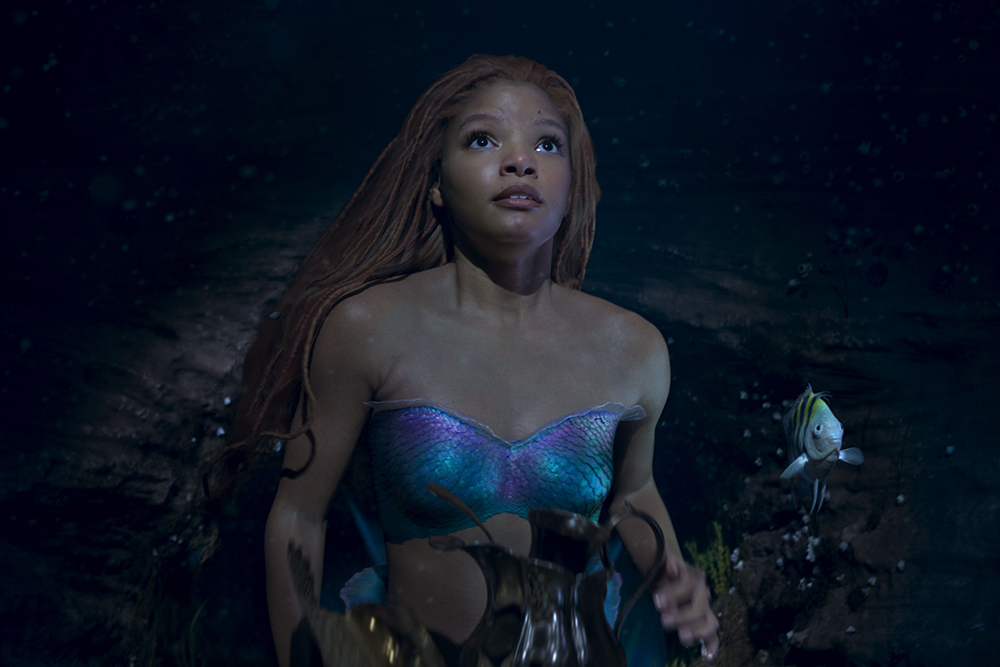
Nischelle : I heard her in the film. I was cracking up.
Rob Marshall : She's just so original and so free, and that's what I mean about protecting the actor, letting them feel free to try things and do things, and that's important. Nischelle : I have a ton of audience questions. Like, yeah, I don't know how we're gonna get through all of these. So I want to get to them. This is for Alan from Liz Shannon Miller. And Liz says, "How does it feel seeing this music that you worked on, not just remain such a cultural staple, but now also get a second life in this new form?"
Alan Menken : [makes noise] It's wonderful. It's incredible. I've been blessed to have that experience many times. And what makes it especially special is finding out what's the team I'm gonna be a part of in giving us a fresh life? That fresh perspective? And when I found out it was gonna be Rob and John, that's bucket list stuff.
Nischelle : Yeah, is it? Yeah.
Alan Menken : It really is.
Nischelle : Well, the three of you, I mean, this is, like, Mount Rushmore minus one in the landscape.
Alan Menken : [laugh] Mount Rushmore.
Nischelle : [laugh] It really is.
Alan Menken : Turning to stone. And then, Lin.
Nischelle : Well, there we go. We can add Lin in there. There you go. [laugh]
Alan Menken : But it's true. All those elements coming in make it a completely original confection. I mean, in many ways,Rob, coming out of the theater, was probably as much a keeper of the flame as I thought I would have to be. He was hanging on to, you know, that's sacred. So it made the lines very simple for us to go, to be a team player and then, to go back and look at what we had before.
Alan Menken : And then, just I refer to this before. The creative process, the eye test creative process? Is this better? Is this better? Is this better? Is this better? Is this better? And you just throw it away and try it again. And we're all comfortable with that approach.
John DeLuca : We're also so lucky that you're flexible in that approach 'cause not everyone is. That's how it grows.
Alan Menken : I said this at our interview yesterday. Being selfless is the most selfish thing you could do because it is the way you get the result that you want, is to be completely flexible and selfless knowing that you created something. And if it's not good enough, oh, or if you replace it, sorry. You created something, try something else. You try something else, you'll go back to that. It's that simple.
Rob Marshall : Collaboration is the key element to any musical on film, on stage; it is all about collaboration. That's how it works.
John DeLuca : Crucial.
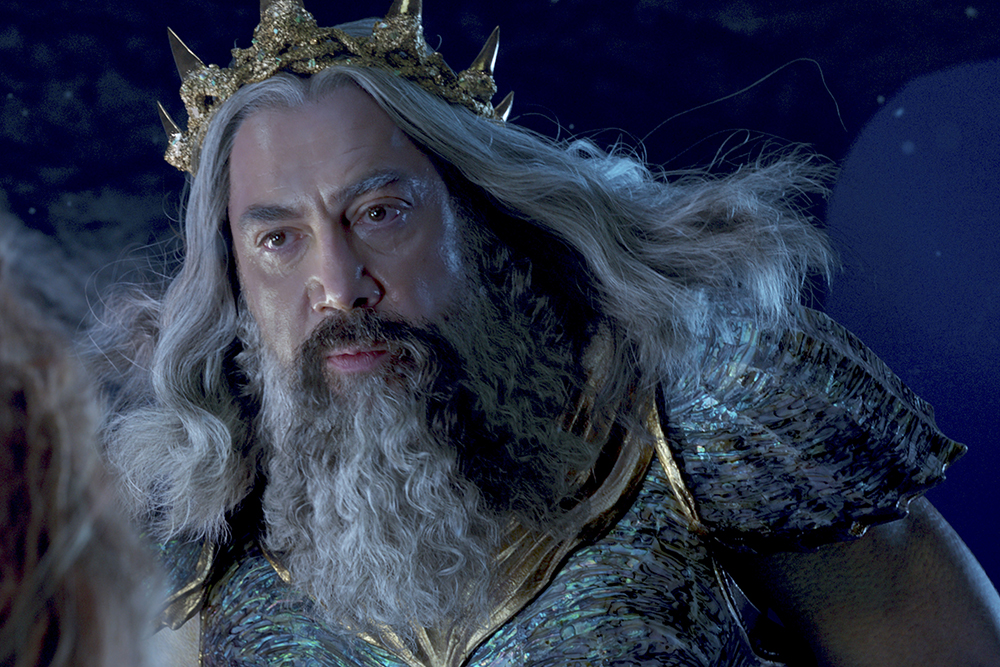
Nischelle : Rob, this question is for you from Gillian Blum at The Direct. And Gillian says, "The quote at the beginning and the motif of it throughout was a really neat addition. How did you pick that quote?"
Rob Marshall : Well, it's so interesting 'cause the first thing that John and I did when we actually started this journey was to go back to the Hans Christian Andersen tale to understand where it all came from. We had known the, sort of, full process, so we needed to feel that. We were immediately aware of how this was a very contemporary story already in the 1830s about this young girl who feels displaced and wants to, you know, go on a journey of self-discovery, you know, to another world. And so, for me, [clears throat] the quote, to be able to find something from Hans Christian Andersen specifically, so we sort of ground this in where it came from, was important to us, to find something from him. And this, you know, it's the most sort of famous quote from the tale. And I have to say that because we were bringing, I think, more depth and emotion, which you can in a live action piece. You know, that's what this genre helps you do. The idea that, because a mermaid has no tears, and she feels more, she suffers more, it felt to us like it set the table for this more emotional telling of the story.
Nischelle : Mm-hmm. I love that. John, this question's for you from Francesca Scorcucch [phonetic]. Francesca.
John DeLuca : [laugh] Is it Italian?
John DeLuca : Scorcucchi. [laugh]
Nischelle : Scorcucchi. There we go. Can you talk about the experience shooting in Sardinia?
John DeLuca : Oh, Sardinia. Italian and Italian and Italian and Sardinia. But, I mean, the first thing that comes to mind is lobster pasta.
John DeLuca : I mean, I have to say that really is.
Rob Marshall : Right to food, John.
Nischelle : Come on.
John DeLuca : We looked at quite a number of islands. [laugh]
Nischelle : Speakin' my love language, John. Come on. [laugh]
John DeLuca : You know, we do look forward to those dinners in Sardinia.
Nischelle : Yes, indeed.
John DeLuca : But we did scout a lot of places and ended up with this. To me, I love this small beach we found in Sardinia. And thankfully, Rob went along with it. And it just helped not only us in our imaginations and with the tale. But it helped that when the actors arrived there, it just grounded us in a place and let us tell the Caribbean
feeling of the song because the songs, you know, it was very important for Rob having "Kiss the Girl" and "Under
the Sea" with the flavor of those songs to give it that Caribbean locale. And they have the most beautiful waters and the most beautiful beaches.
Rob Marshall : And it's rustic, too. It's so rustic and unspoiled.
John DeLuca : Yeah, it was very important because of the Danishinfluence of Hans Christian Andersen, the rocks with the sea was very important to us. So it had everything.
Rob Marshall : Yeah, it really did have everything.
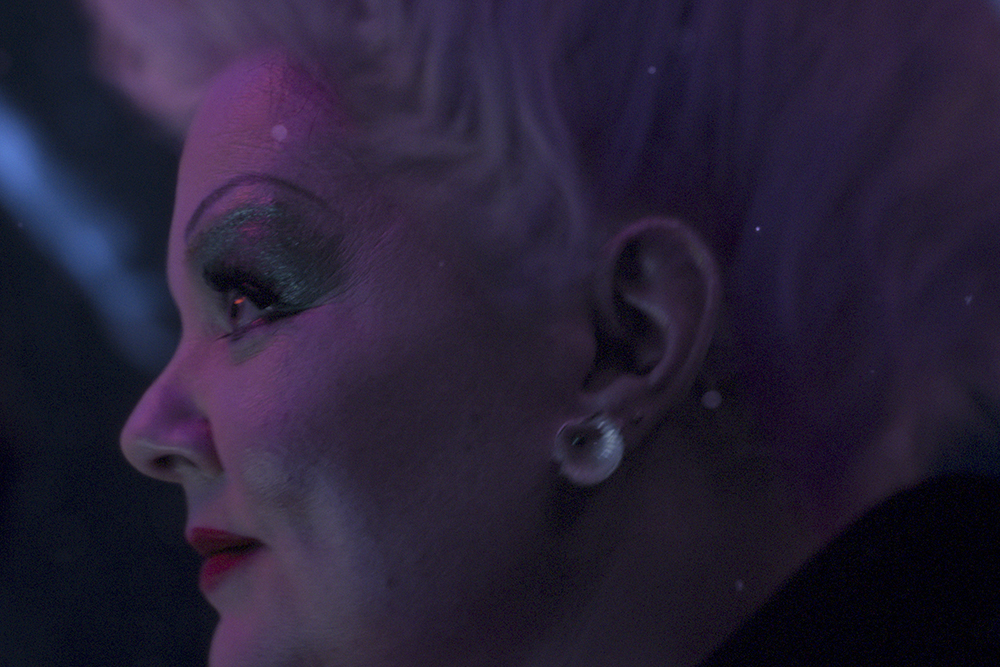
Nischelle : Rob, this question is for you. This is from Ayesha Shahbazi [phonetic]. She says, "This is your fourth film with Disney, which includes Mary Poppins Returns and Into the Woods. What was it that made you want to collaborate with them again, especially on a live-action remake like this one?
Rob Marshall : Because there's nothing like working with them.
Nischelle : Mm-hmm.
Rob Marshall : I feel supported in a massive way. They let you do your work. They trust you. I mean, from Bob Iger to Alan Bergman to Sean Bailey, I mean, all of them are there to literally support artists. And that's what I felt the entire time. You know, this is a massive film with a massive budget, but I never felt that. I never felt that. I never feel that from them. And so, you know, they really, truly, really respect artists, [laugh] I have to say. And that's why we've been there and done these movies with them. We feel a home there. And they wanted us to re-invent and re-imagine. They're not looking for a frame-by-frame, you know, remake. That's not something they were looking for.
John DeLuca : There's a mutual trust and respect.
Rob Marshall : Yeah, it really is. And so, we feel at home. And you now, who else is gonna make these massive musicals? People don't, you know, take those risks anymore. I mean, musicals are very tricky. We talk about this all the time.
Nischelle : They really are.
Rob Marshall : It's like there's a fine line. It's a balancing act. You could literally go off the rails, and it's Saturday Night Live in two seconds, right? So the whole time, you know, we always talk about this, too. When someone starts to sing, it's either completely organic and feels earned, or it's the moment of, "Ooh. They're singing, and it's
weird." [laugh]
Nischelle : You are speaking right to me. I said this very thing because sometimes musicals, and I love a musical, can be so jarring 'cause it's like, "Yes, and I went to the store."
Rob Marshall : I know.
Nischelle : You know, and it makes you go, "Well, what just happened?" But this was seamless. It was seamless.
Rob Marshall : You shouldn't see the work, but it's exactly what the goal is with everything we do.
Alan Menken : Yes, but we're constructing a very delicate organism. And a structure that, as you write a musical for the stage, you're writing something that's gonna have actors coming and going and different designers coming in and different theaters and then an associate director, whatever it is. You have to construct something that is strong enough to be able to be moved around and still hold its shape. So a lot of it's in the structure. And Rob, coming out of musical theater, understands that structure so well.
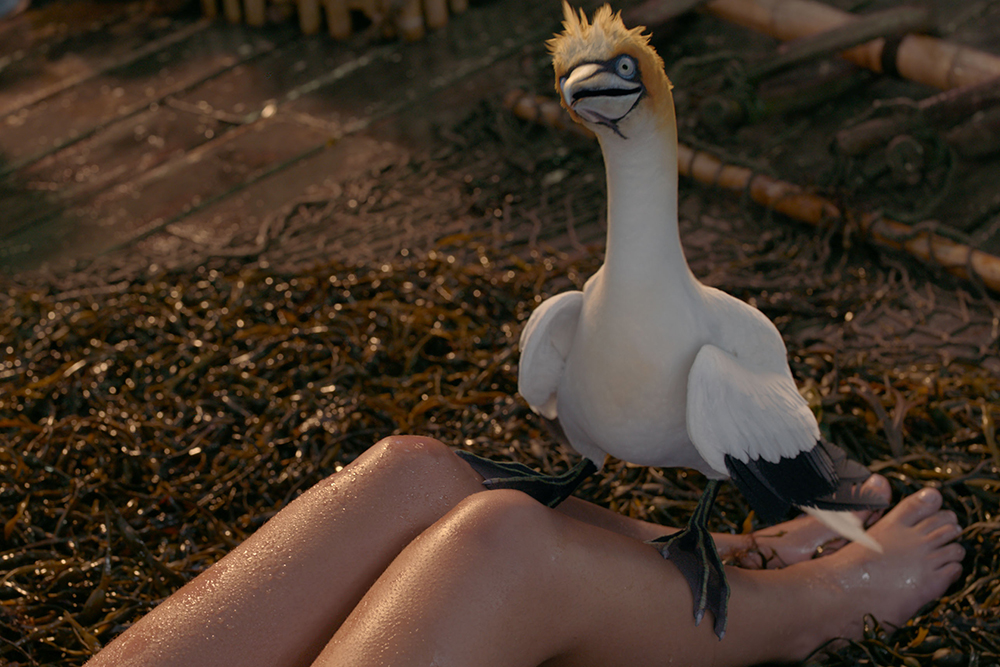
Nischelle : This question is the last question. This question is for Alan. And this is from Rachel Leishman, Alan, and she says, "You have a gift with ballads, particularly for female characters. What is your approach to these characters and their emotions that inspires you to create these iconic songs?"
Alan Menken : Well, I'm tripping over [laugh] the especially "female characters." 'Cause I mean, you know, yes, of course, you write for the character. You write for the moment. You write for the concept of how you're telling a story. What is the tone of the story? What is the exact moment? You set up the DNA. I have a palette of musical
colors, like, you're painting them. And then, you start to shape those colors. For instance, "A Part of Your World."
Okay, you could say that's Ariel's colors, but also, that figure was simply the water flowing. I was just started with [makes noise]. It's just that sense of motion, and it all grows out of that. And then, you know, part of it comes from also experience, of just doing it a lot for many years. You let go, and you just sort of pour into that shape that you've created. Oh, very important. You create [laugh] a mold, a shape. Where does the song start? Where does the song end? How does the character progress dramaturgically throughout the song? Are we gonna open it for dialogue? Everything that's happening, the world we're in, the palette we've decided to use, and then, you just go into that mold. And go, "That's not good enough." "Oh. Oh, wait. That feels right." And so, you just have to be free to both create and react and create and react until you go, "Oh, I'm in love with this." You have to be in love with it. And you have to be willing to throw out the stuff you love if other people don't [laugh] see that way. Go, "Boom." It's just that's the way it goes. I've thrown out beautiful ballads, beautiful ballads. I mean, tons of them.
Nischelle : Oh, my gosh. I wanna know. Like, I wanna [overlap]. This is [overlap].
Rob Marshall : All the trunk songs.
Alan Menken : I mean, we had a song in Hercules. We had a song called "Shooting Star." It was, "No one seems to much to think too much of me here. [makes noise] My shooting star." And it's a song of longing. It was beautiful. We went and Danny Troob did an incredible orchestration, and the song was too sweet. Throw it out. I had to come up with "Go the Distance." So throwing out can be a blessing. And that song, you know, maybe it'll come back someday in some form. But the [makes noise] way you do it is just, you give yourself over to the moment and the character, create the structure you want, and then, pour yourself into it, and be willing to just go, "No, that's the wrong pour." Nischelle : Gentlemen, I mean, I could sit here and talk to you all day.
Rob Marshall : You're so wonderful, Nischelle.
Nischelle : I'm in love with this film. I love, like, picking the brains of the [laugh] masterminds. I appreciate you. I appreciate all the questions. We had so many. People wanna know what you're thinkin'.
Alan Menken : Love that.
Rob Marshall : Very sophisticated questions, too.
Nischelle : And personally, I appreciate you all giving us something in this day and age that we can all identify with, that we can all see ourselves in, no matter what. Last night, Anika Noni Rose said to me, "This movie looks like the sea." You know what I'm saying. How different and diverse the sea is, that's what this movie looks like.
Rob Marshall : Oh, that's beautiful.
Nischelle : And so, I thank you for that. We appreciate you. Bravo.
Rob Marshall : Oh, thank you, Nischelle.
Nischelle : Fantastic job.
Rob Marshall : You're always wonderful to speak to.
John DeLuca : Thank you.

Nischelle : Thank you guys for joining us today, and we will see you next time. Bye.
The Little Mermaid premiered at the Dolby Theatre in Los Angeles on May 8, 2023, and is scheduled to be released theatrically in the United States on May 26, 2023, in RealD 3D, IMAX, Dolby Cinema and 4DX formats, as well as in conventional theaters.
Synopsis :
Ariel, the youngest daughter of King Triton, is a beautiful and spirited young mermaid with an adventurous temperament. A rebel at heart, she is constantly drawn to the world beyond the waves. During her escapades on the surface, she falls under the spell of Prince Eric. Although mermaids are forbidden to interact with humans, Ariel feels she must follow her heart. She makes a deal with Ursula, the terrible sea witch, who grants her the power to live on land, but without suspecting that this pact puts her life - and her father's crown - in danger...
The Little Mermaid
Directed by Rob Marshall
Screenplay by David Magee
Based on Disney's The Little Mermaid by Ron Clements, John Musker The Little Mermaid by Hans Christian Andersen
Produced by Marc Platt, Lin-Manuel Miranda, John DeLuca, Rob Marshall
Starring Halle Bailey, Jonah Hauer-King, Daveed Diggs, Awkwafina, Jacob Tremblay, Noma Dumezweni, Javier Bardem, Melissa McCarthy
Cinematography : Dion Beebe Edited by Wyatt Smith
Music by Alan Menken
Production companies : Walt Disney Pictures, DeLuca Marshall, Marc Platt Productions
Distributed by Walt Disney Studios Motion Pictures
Release dates : May 8, 2023 (Dolby Theatre), May 26, 2023 (United States)
Running time : 135 minutes
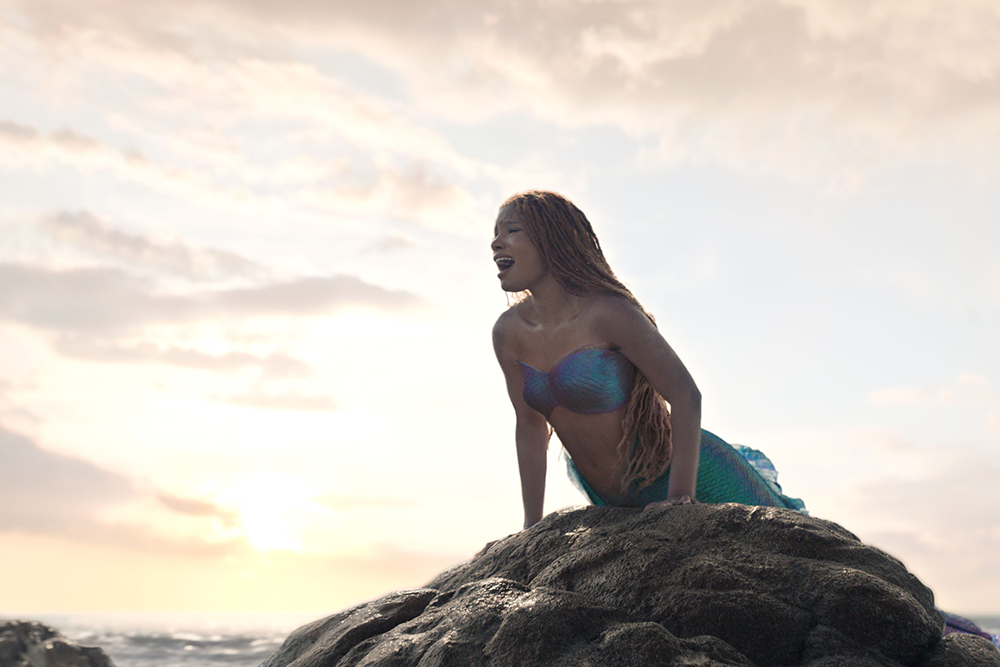
Photos : Copyright The Walt Disney Company

